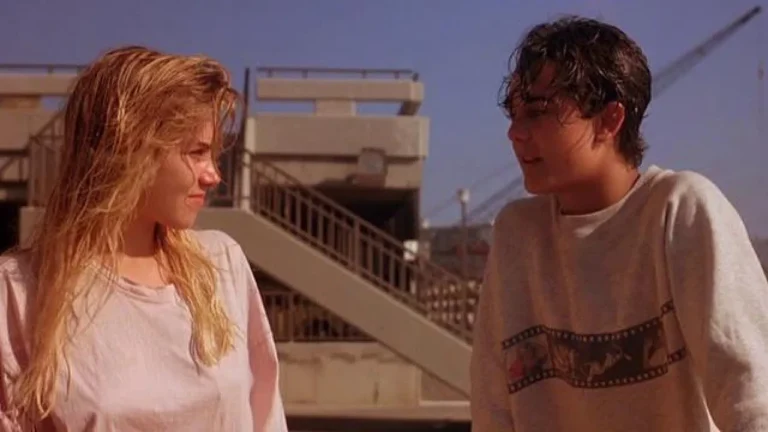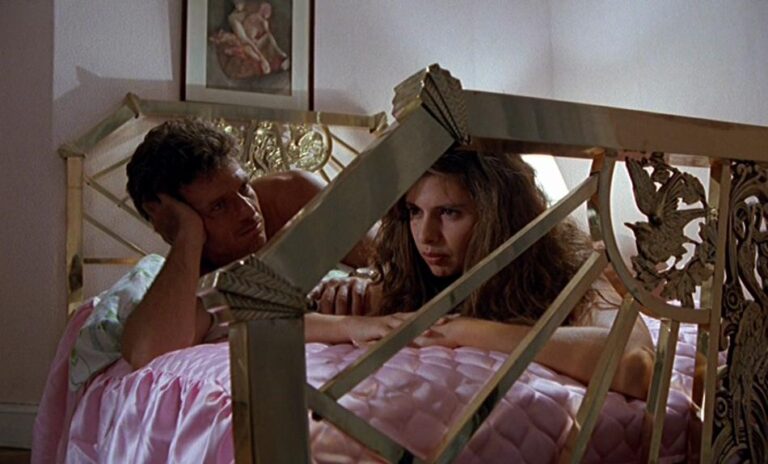Directed by Sofia Coppola
Written by Sofia Coppola
Starring:
- James Woods as Mr. Lisbon
- Kathleen Turner as Mrs. Lisbon
- Kirsten Dunst as Lux Lisbon
- Josh Hartnett as Trip Fontaine
- A.J. Cook as Mary Lisbon
- Hanna Hall as Cecilia Lisbon
- Leslie Hayman as Therese Lisbon
- Chelse Swain as Bonnie Lisbon
Rating: ![]()
Sofia Coppola’s The Virgin Suicides is a cinematic wraith—an elegy suspended in a shimmer of adolescent decay, as elusive as it is exquisite. It lingers like perfume in a sealed room, intoxicating but suffocating, reverent but remote. I have returned to it many times, each viewing a quiet attempt to penetrate its gauzy mysteries, but always I leave with the same uneasy contradiction: admiration tempered by distance, respect clouded by dissatisfaction. For all its haunting beauty, it remains—at least for me—a failure of feeling.
Adapted from Jeffrey Eugenides’ novel, the film unspools as a reverie narrated by a group of now-grown men who once gazed in awestruck silence at the Lisbon sisters: Therese, Mary, Bonnie, Lux, and Cecilia. These girls are less characters than mirages—liturgical visions of doomed femininity, framed not by their own voices but by the memories of boys who never truly knew them. The story is filtered through their nostalgic obsession, and Coppola honors this perspective by making distance her central aesthetic principle. Every image seems drowsy, posthumous. We are never allowed behind the veil.
The restraint is, at first, mesmerizing. Coppola conjures the sterile hush of 1970s suburbia with painterly control, and the film moves like a sleepwalker—gliding through golden light and languid silence, through the ghostly spaces of a house that has already become a mausoleum. Lux, played with aching radiance by Kirsten Dunst, becomes the closest thing to an emotional center, but even she is often treated as image more than flesh. The camera worships her without touching her. This is the film’s poetry—and its central failure.
For while Coppola is a deeply formal filmmaker, with an extraordinary instinct for mood and montage, her rigorous aestheticism becomes an alibi for emotional withdrawal. She presents the Lisbon sisters as icons of unknowability, but does little to trouble the male gaze that enshrines them. We are told these girls are suffering, but that suffering is rendered decorously, even abstractly—as if their pain were part of the wallpaper, another hue in the soft-focus palette. At times, one wonders if Coppola is preserving the sisters’ mystery or simply silencing them.
The film’s second act—where adolescent romance, prom night rituals, and brief liberation play out—marks a shift in tone that Coppola never quite resolves. Josh Hartnett’s Trip Fontaine, though charismatically played, drags the film into territory that feels conventional, even trite. These passages are necessary for narrative contrast, but the tonal cohesion begins to fray. The spiritual unease that once saturated the frame dissipates, and the film slips into an almost ironic sentimentality before wrenching us back into tragedy. In these moments, the oneiric mood curdles into aesthetic posturing.
Even the suicide motif, handled with initial restraint and poetic tact, becomes too diffuse to land with full existential weight. Coppola refuses to moralize, which is commendable—but she also refuses to interrogate. The girls’ final act is portrayed with such eerie serenity that its emotional violence is lost. The aftermath is hollow, not because the deaths are meaningless, but because Coppola’s style cannot accommodate the full dimensions of their despair. The film ends not in catharsis but in beautiful bewilderment.
What The Virgin Suicides captures—better than almost any film of its kind—is the atmosphere of memory as myth: the way adolescence is embalmed in nostalgia, the way tragedy becomes a kind of iconography. But in her devotion to style, Coppola sacrifices intimacy. Her refusal to access the girls’ inner lives is faithful to the novel’s structure, but in cinematic form it becomes a distancing effect too expertly applied. The result is a film that glows from within, but never burns. It is, in every frame, immaculate—but immaculacy, like grief denied, can leave behind only silence.









